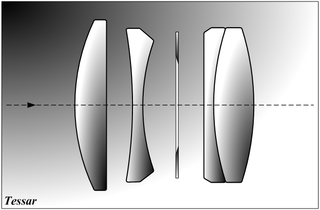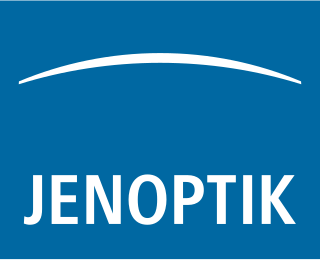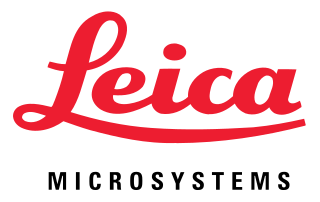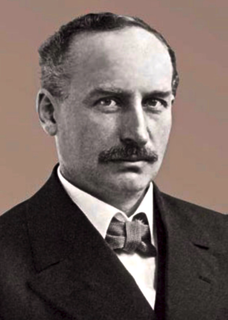See also
- Laika (disambiguation)
- Lieka, a former settlement in Ethiopia
Leica may refer to:

A rangefinder camera is a camera fitted with a rangefinder, typically a split-image rangefinder: a range-finding focusing mechanism allowing the photographer to measure the subject distance and take photographs that are in sharp focus. Most varieties of rangefinder show two images of the same subject, one of which moves when a calibrated wheel is turned; when the two images coincide and fuse into one, the distance can be read off the wheel. Older, non-coupled rangefinder cameras display the focusing distance and require the photographer to transfer the value to the lens focus ring; cameras without built-in rangefinders could have an external rangefinder fitted into the accessory shoe. Earlier cameras of this type had separate viewfinder and rangefinder windows; later the rangefinder was incorporated into the viewfinder. More modern designs have rangefinders coupled to the focusing mechanism so that the lens is focused correctly when the rangefinder images fuse; compare with the focusing screen in non-autofocus SLRs.

Leica Camera AG is a German company that manufactures cameras, optical lenses, photographic lenses, binoculars, rifle scopes and microscopes. The company was founded by Ernst Leitz in 1869, in Wetzlar, Germany.

Carl Zeiss AG, branded as ZEISS, is a German manufacturer of optical systems and optoelectronics, founded in Jena, Germany in 1846 by optician Carl Zeiss. Together with Ernst Abbe and Otto Schott he laid the foundation for today's multi-national company. The current company emerged from a reunification of Carl Zeiss companies in East and West Germany with a consolidation phase in the 1990s. ZEISS is active in four business segments with approximately equal revenue in almost 50 countries, has 30 production sites and around 25 development sites worldwide.

The Tessar is a photographic lens design conceived by the German physicist Paul Rudolph in 1902 while he worked at the Zeiss optical company and patented by Zeiss in Germany; the lens type is usually known as the Zeiss Tessar.

A slide projector is an opto-mechanical device for showing photographic slides.

Cosina Co., Ltd. is a manufacturer of high-end optical glass, optical precision equipment, cameras, video and electronic related equipment, based in Nakano, Nagano Prefecture, Japan.
Rodenstock may refer to:

Jenoptik AG is a Jena, Germany-based integrated photonics group. The company is listed on the Frankfurt Stock Exchange and is included in the TecDAX stock index.

The Wild (Heerbrugg) company was founded in 1921 in Switzerland. The company manufactured optical instruments, such as surveying instruments, microscopes and instruments for photogrammetry among others. The company changed its name several times, first being known as "Heinrich Wild, Werkstätte für Feinmechanik und Optik", then "Verkaufs-Aktiengesellschaft Heinrich Wild's Geodätische Instrumente", later "Wild Heerbrugg AG", later "Wild-Leitz". The company was linked with Leica in 1989, then it became part of Leica Holding B.V. Its subsidiary Leica Geosystems AG became part of the Swedish Hexagon AB Group of companies in 2005.
Leika may refer to:
Leitz may refer to several German companies:
Zeiss or Zeiß may refer to:

The Leica M7 is a 35 mm rangefinder camera introduced by Leica AG in 2002 as a direct successor to the M6. The electronic Leica M7 is a departure from previous mechanical designs for the M series.
Noblex, formerly Docter Optics, is a German manufacturer of optics, including binoculars, rifle scopes, spotting scopes, red dot sights, flashlights and reading glasses. Its headquarters are in Eisfeld, Thuringia, Germany, where most of the products are developed and manufactured. Docter is part of the Analytik Jena Group.

Leica Microsystems GmbH is a German microscope manufacturing company. It is a manufacturer of optical microscopes, equipment for the preparation of microscopic specimens and related products. There are ten plants in eight countries with distribution partners in over 100 countries. Leica Microsystems emerged in 1997 out of a 1990 merger between Wild-Leitz, headquartered in Heerbrugg Switzerland, and Cambridge Instruments of Cambridge England. The merger of those two umbrella companies created an alliance of the following 8 individual manufacturers of scientific instruments. American Optical Scientific Products, Carl Reichert Optische Werke AG, R.Jung, Bausch and Lomb Optical Scientific Products Division, Cambridge Instruments, E.Leitz Wetzlar, Kern & Co., and Wild Heerbrugg AG, bringing much-needed modernization and a broader degree of expertise to the newly created entity called Leica Holding B.V. group. In 1997 the name was changed to Leica Microsystems and is a wholly-owned entity of Danaher Corporation since July 2005. Danaher is a US venture capital company.
Ernst Leitz GmbH was a German corporation based in Wetzlar, a German centre for optics as well as an important location for the precision engineering industry, now divided into four independent companies:
The Huawei P series is a line of high-end and medium-range HarmonyOS smartphones produced by Huawei. The P series was formerly marketed as part of Huawei's larger Ascend brand. Some models are called P smart.

Ernst Leitz II was a German business person and humanitarian. He was the second head of the optics company now known as Leica Camera and organized the Leica Freedom Train to allow people, most of whom were Jewish, to escape from Germany during Nazi times.